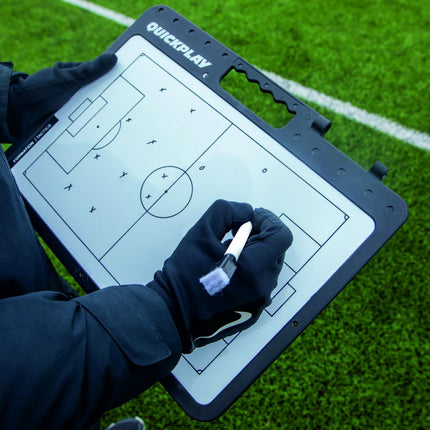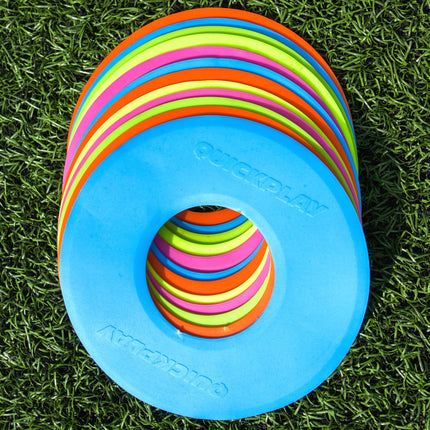In the fast-paced world of football, where split-second decisions can make or break a match, reaction time stands as a critical factor that separates the good from the great. Whether it’s intercepting a pass, making a crucial save, or seizing an opportunity to score, a player’s ability to react quickly and effectively can significantly impact the outcome of a match. In my 20+ years of coaching I have found that one of the biggest factors dictating positive match outcomes is the athlete’s ability to have a faster reaction time than their opponents. Keep reading to see how a fast reaction time can elevate on-pitch success.

React or Retreat: Why Reaction Time Matters
Football is a sport characterized by constant movement and rapid changes in direction. Players must react swiftly to the unpredictable nature of the match, responding to the movements of opponents, teammates, and the ball itself. A delayed reaction can result in missed opportunities, defensive lapses, or conceded goals. Here are some of the reasons I have seen why reaction time is crucial for football players.
1. Winning 50/50 Challenges
Just like in the days of primitive man beating an adversary to a source of food. In football, winning possession of the ball often comes down to 50-50 challenges, where two players vie for control. The player with quicker reaction time has a better chance of getting to the ball first, whether it’s to intercept a pass, win a loose ball, or make a crucial tackle.
2. Defensive Stability
Solid defending requires not only tactical awareness but also the ability to react swiftly to offensive moves. A defender with a fast reaction time can anticipate an opponent's dribble or pass, closing down space and cutting off potential attacking threats.
3.Goalkeeping Heroics
For goalies, reaction time is paramount. The ability to quickly read and react to shots on goal can mean the difference between making a save and conceding a goal. A split-second reaction can turn a seemingly unstoppable shot into a routine save.
4.Seizing Scoring Opportunities
In the attacking third, quick reactions can lead to scoring opportunities. Whether it's capitalizing on a defensive mistake, getting into position for a cross, or reacting to a rebound, strikers and midfielders with fast reactions are more likely to find the back of the net.
Training and Reflexes: How to Improve Reaction Time
Like any other skill, reaction time can be honed and improved through targeted training. Here are some strategies and tactics that I use to help my football players improve their reaction time and reflexes.
1.Vison and awareness drills
Players can improve their reaction time by training their peripheral vision and spatial awareness. Drills that involve scanning the pitch, identifying teammates and opponents, and anticipating their movements can help players react more quickly to changing situations. Some great tools to help you do this effectively are the Agility Poles and Cognitive Cones. We want to have dexterity in our movement. Dexterity is the ability to find a motor solution for any external situation, that is, to adequately solve any emerging motor problem. Pitch markers and mannequins are a great way to enhance these skills.

2.Reaction drills
Specific drills designed to test and improve reaction time are essential for football players. These drills can include quick passing exercises, agility drills with sudden changes of direction, and reaction ball drills that require players to respond to unpredictable bounces. The best tool I have found for this is the Smart Rebounder.
 3.Video analysis: Analyzing match footage can help players identify areas for improvement in their reaction time. By studying their own performances and those of top players, they can learn to anticipate situations better and react more quickly in future matches. Athletes that can exploit internal capabilities (strength, power, energy systems, speed/agility) enhance their adaptability under perturbations (chaos) from the environment. Studying film can be tedious, monotonous and often times boring, but all of the greats do it!
3.Video analysis: Analyzing match footage can help players identify areas for improvement in their reaction time. By studying their own performances and those of top players, they can learn to anticipate situations better and react more quickly in future matches. Athletes that can exploit internal capabilities (strength, power, energy systems, speed/agility) enhance their adaptability under perturbations (chaos) from the environment. Studying film can be tedious, monotonous and often times boring, but all of the greats do it!
4.Mental preparation: A sharp mind is just as important as a quick body on the football pitch. Mental preparation techniques such as visualization, focus exercises, and mindfulness can help players stay alert and make split-second decisions under pressure. Here are a few of my favorite mental prep strategies:
A.Psychological Training
Paint a crystal-clear picture in your head, because your brain doesn’t know the difference between thinking and doing. Albert Einstein said, “Imagination is more powerful than knowledge.”
B.Benefits of visualization “Visualize the Movement”
- Thinking is the same as doing
- The more accurate the situation the more accurate the pathway you carve out in your brain
- Allows you to manage expectations more accurately
- Evokes feelings to training dealing with them in real time
- Avoid mistakes
- Presence of mind in high pressure situations
- More confidence
Imagine, in your own way, the pathway to successfully achieving a task. Consider what it looks like, feels like, sounds like. The more representative the better!
C.Self-Talk is another great way to prepare mentally.
In a self-talk and sports performance meta-analysis published in 2011, Perspectives on Psychological Science., the results of the study establish the effectiveness of self-talk in sport, encourage the use of self-talk as a strategy to facilitate learning and enhance performance.
- Self-talk characteristics should include:
- Content: Instructional or Motivational
- Selection: Assigned by coach or athlete’s choice
- Overtness: Silent or Out Loud
5.Rest
For an athlete, a tired mind is just as meaningful as a tired muscle. Cognitive fatigue leads to a reduction in performance:
- Poor decision making
- Poor attention span
- Poor reaction times
- Poor focus
- Poor execution of physical skill
As coaches we are able to adjust different levers to create optimal performance variables to arrive at our desired goal for our players. Think about these three Performance Levers:
- Environment: gravity, ambient temperature, natural light, terrain, auditory feedback
- Athlete: body size, fitness, mental skills, perceptual and decision-making skills, and personality factors
- Task: rules of the sport or tournament, equipment used such as boots, ball, pitch sizes, number of players, matches to be played
It is important for football players to do more Open-Skills types of training, than Closed-Skills. Open-skills include unpredictable, constantly changing, and oppositional stimuli. But remember, open-skills activities may differentially demand more of specific cognitive functions when compared to closed-skills, however, both types skills are very important and may improve cognition.

Open and Closed-Skills are commonly done on the pitch itself with cones, poles, ladders etc., these products can all be found here:https://www.quickplaysport.com/ Tell them Coach Cummings sent you!
Conclusion
In the dynamic and fast-paced world of football, reaction time is a game-changer. Whether it’s in defense, midfield, or attack, the ability to react quickly and decisively can give players a crucial edge over their opponents. By incorporating targeted training techniques and maintaining mental sharpness, football players can elevate their performance and make a significant impact on the outcome of matches. In a sport where every second counts, mastering reaction time can mean the difference between victory and defeat.
Now, Go Get After It!
--Coach Cummings







